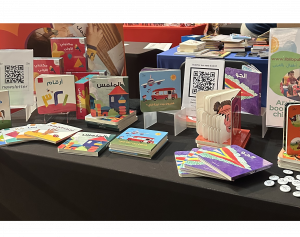Reading books in Arabic dialects to children is revolutionising early literacy development. Recent research highlights the significant impact this practice has on children’s reading skills and overall language comprehension. Let’s explore why reading dialect-based books is so powerful for both parents and young learners.
Enhancing Early Literacy Skills
When parents read Arabic dialect books to their children, they provide a crucial foundation for early literacy:
- Word Recognition: Children easily match familiar spoken words with written text, accelerating reading skills.
- Phonological Awareness: Exposure to dialect sounds strengthens language understanding, a key predictor of reading success.
- Fluency: Regular exposure to text mirroring spoken language leads to more fluent reading.
Boosting Comprehension
Reading in dialect significantly enhances a child’s understanding of the text:
- Immediate Understanding: Children grasp stories without mental translation from formal Arabic (Fusha) to everyday language.
- Deeper Engagement: Familiar language allows focus on content, characters, and themes rather than decoding unfamiliar words.
- Increased Retention: Information presented in dialect is more likely to be remembered and applied.
Easing the Parent’s Role
For parents, reading dialect books aloud offers several advantages:
- Reduced Mental Fatigue: Parents read without on-the-fly translation, making the experience more enjoyable.
- Increased Reading Time: Less effort may lead to longer reading sessions, providing more language exposure.
- Improved Expression: Reading in native dialect allows for natural conveyance of emotions and nuances.
Research-Backed Benefits
Recent studies support the effectiveness of dialect-based reading:
- A “Journal of Child Language” study found faster vocabulary acquisition and better reading comprehension in children exposed to dialect-based materials.
- Research by Reham Shindy showed faster initial progress in literacy skills for students using dialect-based materials.
Practical Tips for Parents
To maximise the benefits of reading Arabic dialect books:
- Make it a daily habit: Set aside dedicated reading time each day.
- Engage in discussion: Ask questions about the story and encourage your child to share their thoughts.
- Vary your book selection: Choose books with different themes and complexity levels to keep your child interested.
- Be expressive: Use different voices for characters and emphasize key words to make the story come alive.
- Connect stories to real life: Help your child relate the book’s content to their own experiences.
The Bridge to Standard Arabic
While dialect books offer numerous benefits, it’s important to note that they can also serve as a bridge to standard Arabic:
- Gradual Transition: As children become comfortable with reading in dialect, introduce standard Arabic texts gradually.
- Comparative Learning: Point out similarities and differences between dialect and standard Arabic to build linguistic awareness.
- Multilingual Approach: Embrace both forms of Arabic as valuable parts of a child’s linguistic repertoire.
Conclusion
Reading Arabic dialect books to children is a powerful tool for developing strong literacy skills, enhancing comprehension, and creating an enjoyable reading experience. By embracing dialect-based reading materials, we can foster a love for reading and set children on a path to academic success.
As more research emerges, it’s becoming clear that incorporating dialect books into early childhood education could revolutionize Arabic literacy instruction. Parents and educators alike should consider the immense value of these resources in supporting children’s language development.
By making Arabic dialect books a regular part of a child’s reading routine, we’re not just teaching them to read – we’re opening up a world of language, culture, and imagination that will serve them well throughout their lives.
As we’ve seen, the benefits of reading Arabic dialect books to children are immense and far-reaching. Liblib Books offers a treasure trove of engaging, contemporary and relevant books written in familiar Arabic dialects. By investing in Liblib’s collection, you’re not just buying books – you’re unlocking your child’s potential for language mastery, cultural connection, and academic success. With captivating illustrations, and language that feels like home, Liblib Books make reading time a joy for both parents and children. Don’t miss this opportunity to transform your child’s learning journey. Visit Liblib’s online shop today and start building your home library of Arabic dialect books. Your child’s future self will thank you for this invaluable gift of language and literacy.





